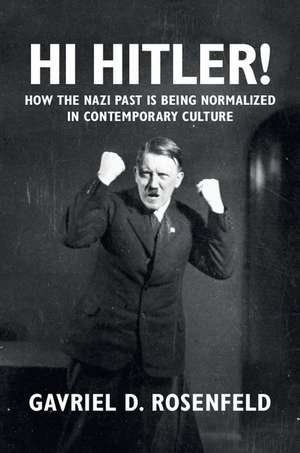Hi Hitler!: How the Nazi Past Is Being Normalized in Contemporary Culture
Autor Gavriel D. Rosenfelden Limba Engleză Paperback – 3 dec 2014
| Toate formatele și edițiile | Preț | Express |
|---|---|---|
| Paperback (1) | 239.72 lei 3-5 săpt. | |
| Cambridge University Press – 3 dec 2014 | 239.72 lei 3-5 săpt. | |
| Hardback (1) | 519.86 lei 6-8 săpt. | |
| Cambridge University Press – 3 dec 2014 | 519.86 lei 6-8 săpt. |
Preț: 239.72 lei
Nou
Puncte Express: 360
Preț estimativ în valută:
45.88€ • 49.81$ • 38.54£
45.88€ • 49.81$ • 38.54£
Carte disponibilă
Livrare economică 02-16 aprilie
Preluare comenzi: 021 569.72.76
Specificații
ISBN-13: 9781107423978
ISBN-10: 110742397X
Pagini: 476
Ilustrații: 46 b/w illus.
Dimensiuni: 152 x 228 x 22 mm
Greutate: 0.77 kg
Editura: Cambridge University Press
Colecția Cambridge University Press
Locul publicării:New York, United States
ISBN-10: 110742397X
Pagini: 476
Ilustrații: 46 b/w illus.
Dimensiuni: 152 x 228 x 22 mm
Greutate: 0.77 kg
Editura: Cambridge University Press
Colecția Cambridge University Press
Locul publicării:New York, United States
Cuprins
Introduction; 1. A 'good war' no more: the new World War II revisionism; 2. From history to memory and back again: debating the Holocaust's uniqueness; 3. Probing the limits of speculation: counterfactualism and the Holocaust; 4. Nazis that never were: new alternate histories of the Third Reich; 5. Humanizing Hitler: the Führer in contemporary film; 6. Between tragedy and farce: Nazism on the Internet; Conclusion; Notes; Bibliography; Index.
Recenzii
'Endowed with erudition, deep scholarship, fluent style and a sense of humor, Hi Hitler is a major contribution to our understanding of current memories of the Third Reich and their consequences.' Alon Confino, author of A World Without Jews: The Nazi Imagination from Persecution to Genocide
'Gavriel D. Rosenfeld's Hi Hitler! is a compelling analysis of the way a broad range of scholars, filmmakers, and writers have addressed and are currently addressing the legacy of Nazism, the Third Reich and the Holocaust. Anyone who wonders how a specifically situated historical event has come to have such broad resonance and meaning today across continents, cultures, religions and nationalities will find this book indispensable.' Deborah Lipstadt, author of History on Trial: My Day in Court with a Holocaust Denier and Denying the Holocaust: The Growing Assault on Truth and Memory
'Gavriel D. Rosenfeld has tracked the idea of Hitler - in all its revisionist guises - with keen insight, care and spectacular force.' Noah Isenberg, author of Edgar G. Ulmer: A Filmmaker at the Margins
'An interesting and important book, because it will give many readers - as it did this one - much food for thought. It takes us forward in understanding contemporary processes of confronting Nazism and points to future avenues we need to explore. Few books do that. It is fluidly written … engaging, well-illustrated and extraordinarily well-informed. It provides a much-needed comparison of memory trends across a number of countries and raises uncomfortable questions about possible processes of trivialization. It deserves a wide readership.' William Niven, German History
'Referencing books, speeches, movies, and essays, Rosenfeld inexorably builds a thoroughly convincing case that something has shifted in both academia and in politics - that the Holocaust's heretofore unquestioned status as the great sin of the twentieth century (and by association, the Nazis' status as the century's greatest villains) is now far from a consensus.' William O'Connor, The Daily Beast
'Rosenfeld's study is important and timely, as well as lucid, engaging and readable.' Anna Katharina Schaffner, Times Literary Supplement
'The primary argument here is that an increasing number of historical representations - both academic and popular - normalize the Nazi past by relativizing, universalizing, or aestheticizing it. The more such depictions flatten the moral contours of the past, however, the more they draw attention to the uniqueness of their subject. Because the Nazi past has not been allowed to fade organically, Rosenfeld claims, it has entered into a 'dialectic of normalization' that serves only to reinforce this past's exceptionality. The author certainly presents much evidence to substantiate these arguments. Rosenfeld's prowess at synthesizing both historiography and media products is impressive. As a descriptive enterprise, the book makes a tremendous contribution and will be cited as a landmark study for years to come.' S. Anderson, Choice
'Gavriel D. Rosenfeld's book on the legacy of the Holocaust and World War II strikes new ground through his inclusion of new media in an analysis of how popular memory has undergone a process of normalization. While he is interested in the normalization process in the United States, Great Britain, and Germany, he also covers recent trends in Eastern Europe, Israel, and a few other places, giving the work a global scope and revealing intellectual trends as transnational phenomena.' Jon Berndt Olsen, The Journal of American History
'… [a] fascinating and perceptive book.' Sheldon Kirshner, Sheldon Kirshner Journal
'… detailed, illuminating and very informative. … Rosenfeld's book is engrossing and thought-provoking.' Richard J. Evans, The Guardian
'Gavriel D. Rosenfeld's monograph Hi Hitler! offers thought-provoking insights into contemporary historiography and popular-cultural representations of the Third Reich.' John Williams, The Journal of Modern History
'Gavriel D. Rosenfeld's Hi Hitler! is a compelling analysis of the way a broad range of scholars, filmmakers, and writers have addressed and are currently addressing the legacy of Nazism, the Third Reich and the Holocaust. Anyone who wonders how a specifically situated historical event has come to have such broad resonance and meaning today across continents, cultures, religions and nationalities will find this book indispensable.' Deborah Lipstadt, author of History on Trial: My Day in Court with a Holocaust Denier and Denying the Holocaust: The Growing Assault on Truth and Memory
'Gavriel D. Rosenfeld has tracked the idea of Hitler - in all its revisionist guises - with keen insight, care and spectacular force.' Noah Isenberg, author of Edgar G. Ulmer: A Filmmaker at the Margins
'An interesting and important book, because it will give many readers - as it did this one - much food for thought. It takes us forward in understanding contemporary processes of confronting Nazism and points to future avenues we need to explore. Few books do that. It is fluidly written … engaging, well-illustrated and extraordinarily well-informed. It provides a much-needed comparison of memory trends across a number of countries and raises uncomfortable questions about possible processes of trivialization. It deserves a wide readership.' William Niven, German History
'Referencing books, speeches, movies, and essays, Rosenfeld inexorably builds a thoroughly convincing case that something has shifted in both academia and in politics - that the Holocaust's heretofore unquestioned status as the great sin of the twentieth century (and by association, the Nazis' status as the century's greatest villains) is now far from a consensus.' William O'Connor, The Daily Beast
'Rosenfeld's study is important and timely, as well as lucid, engaging and readable.' Anna Katharina Schaffner, Times Literary Supplement
'The primary argument here is that an increasing number of historical representations - both academic and popular - normalize the Nazi past by relativizing, universalizing, or aestheticizing it. The more such depictions flatten the moral contours of the past, however, the more they draw attention to the uniqueness of their subject. Because the Nazi past has not been allowed to fade organically, Rosenfeld claims, it has entered into a 'dialectic of normalization' that serves only to reinforce this past's exceptionality. The author certainly presents much evidence to substantiate these arguments. Rosenfeld's prowess at synthesizing both historiography and media products is impressive. As a descriptive enterprise, the book makes a tremendous contribution and will be cited as a landmark study for years to come.' S. Anderson, Choice
'Gavriel D. Rosenfeld's book on the legacy of the Holocaust and World War II strikes new ground through his inclusion of new media in an analysis of how popular memory has undergone a process of normalization. While he is interested in the normalization process in the United States, Great Britain, and Germany, he also covers recent trends in Eastern Europe, Israel, and a few other places, giving the work a global scope and revealing intellectual trends as transnational phenomena.' Jon Berndt Olsen, The Journal of American History
'… [a] fascinating and perceptive book.' Sheldon Kirshner, Sheldon Kirshner Journal
'… detailed, illuminating and very informative. … Rosenfeld's book is engrossing and thought-provoking.' Richard J. Evans, The Guardian
'Gavriel D. Rosenfeld's monograph Hi Hitler! offers thought-provoking insights into contemporary historiography and popular-cultural representations of the Third Reich.' John Williams, The Journal of Modern History
Notă biografică
Descriere
Analyzes how the Nazi past has become increasingly normalized within western memory since the start of the new millennium.











